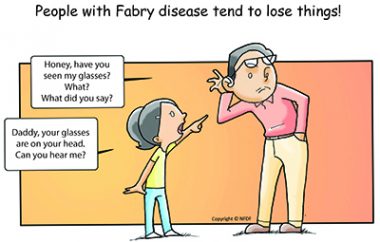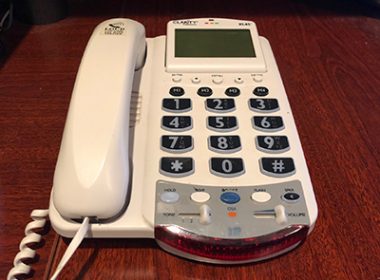How I Adapted to Gradual Hearing Loss Due to Fabry Disease
Written by |

Millions of adults around the world have hearing loss. Like me, most people have a relative who speaks loudly, turns up the volume on the television, uses closed-captioning on the TV, asks people to repeat everything, and gets close to them to hear what they’re saying. Most of those relatives probably have some amount of hearing loss.
What I now know from my experience with hearing loss is that learning to be hearing-impaired is much more difficult than I realized. I am no longer a bystander in this affair. I have been wearing hearing aids for about 15 years, and I’m still trying to improve my communication skills.

(Courtesy of Jerry Walter)
In 1979, when I learned at the age of 25 that I have Fabry disease, I read that its many symptoms can include sudden and progressive hearing loss. Fortunately, it wasn’t until more than 20 years later that I began to lose my hearing.
In about 2002, a couple years before my hearing started to worsen, I began experiencing tinnitus. It started with mildly annoying intermittent episodes of ringing in my ears and progressed for years into extremely irritating constant ringing. It was especially loud and more invasive when I was alone in a quiet room at night. The constant noise often kept me from sleeping and affected my concentration.
Now, nearly 20 years later, my tinnitus is still always present, but it doesn’t bother me much anymore, as my hearing aids help to suppress the ringing sound.
In 2004, I began to have difficulty hearing people in large meetings at work. I visited an audiologist for a hearing evaluation. It didn’t take long for the doctor to recommend hearing aids, which I received soon after.
I remember the audiologist’s comment that she was surprised I had adapted to my hearing loss so well and apparently had developed my own compensation techniques to communicate effectively. I should have gotten hearing aids long before I did.
Many subsequent hearing evaluations indicated continued progressive hearing loss over the years. I’ve had many new sets of hearing aids with updated technology each time. I added a few other devices to assist me, such as a special phone for the hearing-impaired with a volume-boost capability and a small portable speaker device to send conversations directly into my hearing aids. And of course, I increased my use of closed-captioning on the television when it became too difficult to hear the dialogue with acceptable clarity.
Several years ago, my hearing evaluation rated me at severe hearing loss in my right ear and profound hearing loss in my left ear. Without my hearing aids, I am almost totally deaf. I am thankful for technology.
I continue to learn how to be hearing-impaired, but it is not always easy. Everyone with hearing loss may not be just like me, but following is a list of things that help with my ability to hear and respond to others appropriately and to stay connected to the world.
- The best way to have a meaningful and productive conversation with me is face to face in a quiet place without background noise or distractions. In today’s world, face-to-face communication may take place on Zoom, but that’s OK.
- Try to maintain face-to-face contact. I can’t lip-read, but it still helps me to understand by watching people speak to me. If a person looks away while speaking, I may miss their words while they are turned away.
- I sometimes forget and speak to someone across the room. That is always a bad idea, because I’m not close enough to hear the answer.
- My hearing aids help a great deal to increase volume, but they don’t always help with the clarity of the sound. If you are using a built-in computer microphone on a Zoom call, sit close to your computer’s microphone for better quality and clarity.
- Headset microphones usually work OK as long as you keep the microphone close to your mouth.
- Minimize background noises. Hearings aids tend to amplify all sound, not just a speaker’s voice. Other people talking, fans, air conditioners, music, water running, and other background noises can interfere with hearing someone clearly.
- The other person shouldn’t walk around while we are talking. Trying to follow sound moving around the room rarely produces good results.
- Cellphones are usually very difficult for me unless I am stationary and in a quiet place.

Jerry’s desk phone has special features for the hearing-impaired. (Photo by Jerry Walter)
I have made the transition. I now always use closed-captioning on the television when I am alone. Sound with poor clarity is just noise to me. I have learned to enjoy silence over noise.
***
Note: Fabry Disease News is strictly a news and information website about the disease. It does not provide medical advice, diagnosis, or treatment. This content is not intended to be a substitute for professional medical advice, diagnosis, or treatment. Always seek the advice of your physician or other qualified health provider with any questions you may have regarding a medical condition. Never disregard professional medical advice or delay in seeking it because of something you have read on this website. The opinions expressed in this column are not those of Fabry Disease News or its parent company, Bionews, and are intended to spark discussion about issues pertaining to Fabry disease.






Brian Hunter
You are a true inspiration Jerry. Keep on rocking!
Jerry Walter
Thank you, Brian!
Rebekah Hochhauser
Thank you for your article. Clearly Fabry has made you incredibly resilient and resourceful.
Jerry Walter
Thank you, Rebekah! I learn something new every day.
Diane Rothman
I learn new things with each article. Looking forward to the next one.
Jerry Walter
Thank you, Diane!
Susan Kellett
Thanks Jerry, I have not been formally diagnosed with Fabry's yet but have many symptoms. My GP suspects it is a likely diagnosis. Unfortunately in Australia it costs about $400 for the definitive test, as it is not covered under Medicare. I am currently trying to negotiate an affordable cost or payment plan for this test, as I am only on a Disability income.
Hearing loss is definitely a problem for me and like you I should have had hearing aids years ago but I held out due to cost. Mine were $2,500 and the government funded me for $1,500. (they connect to my Iphone) Thank you for your helpful article.
Eve R Rubell
I recently got my first hearing aids. I didn't realize how much I relied on reading peoples' lips until we all started wearing masks. My hearing aids are blue tooth compatible so I can hear phone calls, podcasts and music from my iphone through the hearing aids. The clarity is better than before, but not as good as I had hoped.